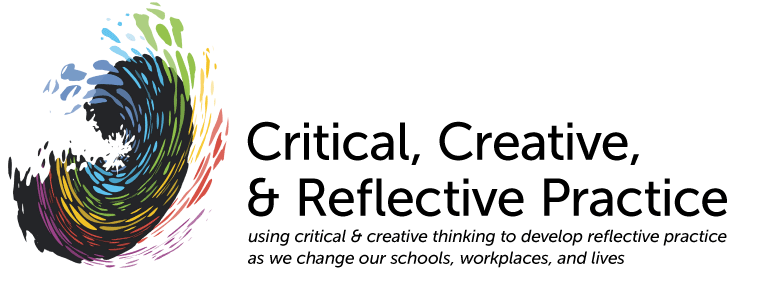What counts as "transformative" learning? Reflecting on personal experience in our learning, teaching, and lives.
A Collaborative Exploration (CE) in which participants explore the meaning of transformative learning by examining their own learning experiences and challenging what is, or is not transformative.
- In brief, CEs are an extension of Problem- or Project-Based Learning (PBL) and related approaches to education in which participants address a scenario or case in which the problems are not well defined, shaping their own directions of inquiry and developing their skills as investigators and prospective teachers (in the broadest sense of the word). (For more background, read the prospectus.)
- If you want to know what a CE requires of you, review the expectations and mechanics.
- on hangout for 1 hour each week Thursdays 5-6pm (US EST), April 9, 16, 23, and 30. The URL for the first hangout will be provided only to those who register (via http://bit.ly/CEApply), which entails making a commitment to attend that 1st session and at least 2 of the other 3 hangouts.
- If you are wondering how to define a meaningful and useful approach to the topic, let us present a scenario for the CE and hope this stimulates you to apply to participate. We will then let CE participants judge for themselves whether their inquiries are relevant.
- Intended outcomes for participants of this CE are of two kinds:
- a) tangible: a compilation or an analysis of what happens (and what doesn't) when reflective practice is promoted (via teaching, workshops, coaching, retreats, etc); and
- b) experiential: being impressed at how much can be learned with a small commitment of time using the CE structure to motivate and connect participants.
Description:
Over the past several decades, interest in transformative learning has continued to develop, and there are ongoing attempts to understand what this really means. Theories promoted by Jack Mezirow (e.g., Transformative Learning Theory), Paulo Friere ( e.g., conscientization), and others have attempted to define and describe what conditions, approaches, and shifts in perspective amount to the change that is implied by "transformative". More recently, Michael Newman (2012) has raised a "mutinous thought: perhaps there is no transformative learning; perhaps there is just good learning." He goes on to explain the flaws in the use of language and in other qualities that we use to identify transformative learning and attempt to demonstrate how it works. Under his view, a range of outcomes are possible when we learn, but all of these involve change to some degree, and therefore all learning can be transformative; this then makes the term and the concept ultimately meaningless, impossible to verify, and depend too much on subjective, inspirational stories, to the point where we may be better off abandoning this notion and focus on the aspects that make up
good learning.
In this Collaborative Exploration, we will explore what can be said about transformative learning when we examine it through reflection on our personal experiences. When we use these experiences to build an understanding from the bottom up about what is or is not transformative, what else can we discover about what we
think we know, and what we are actually
doing with that knowledge, beyond appreciating our memories of those experiences?
Additionally, we might then ask other questions that explore where the transformative connects more broadly with our learning, teaching, and lives. What do we
perceive as our own transformative experiences, and what can we learn by looking back on them and examining what made them so? What gets discovered and uncovered when we try to tell our own stories of transformation? How has transformation been catalyzed through the learning that was straightforward, ordinary, and pragmatic as well as from the deeply engaged or profound experiences? And then, how have such experiences eventually changed who we are as lifelong learners? Can we find relationships between the transformative experiences and the
practices that we use in our ongoing teaching and learning, and in other types of work? What happens when we make deliberate attempts to build the transformative into these areas?
(For additional background on a related past Collaborative Exploration, see
https://www.cct.umb.edu/CE3).
References:
Mezirow, J. (1991). Transformative dimensions of adult learning. San Francisco, CA: Jossey-Bass.
Newman, M. (2012a). Calling transformative learning into question: Some mutinous thoughts. Adult Education Quarterly, 62(1), 36-55.
